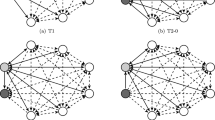Abstract
I refine the multi-utility model and identify the minimal number W of total orders that is sufficient to rationalize a path independent choice function. This identification invokes the well-known pigeonhole principle: any dataset of size \(W+1\) that is rationalized by W rankings must contain at least two distinct observations where the same ranking is maximized. In general, the index W can be huge even for reasonable choice functions, such as top-ten rules. If W is constrained, then minimal rationalizations can be found in polynomial time via an explicit focal algorithm. The axiom of Expansion (Sen’s \(\gamma \)) describes a special case where the index W must equal the capacity—the largest number of elements that may be selected together in a menu.
Similar content being viewed by others
References
Aizerman, M., Malishevski, A.: General theory of best variants choice. IEEE Trans. Autom. Control 26, 1030–1041 (1981)
Arrow, K.: Rational choice functions and orderings. Econometrica 26, 121–127 (1959)
Aygűn, O., Sőnmez, T.: Matching with contracts: comment. Am. Econ Rev. 103, 2050–51 (2013)
Block, H., Marschak, J.: Random orderings and stochastic theories of response. In: Olkin, G., Hoeffding, M., Mann, H. (eds.) Contributions to Probability and Statistics, pp. 97–132. Stanford University Press, Palo Alto (1960)
Chambers, C., Yenmez, M.B.: Choice and matching. Am. Econ. J. Microecon. 9, 126–147 (2017)
Demuynck, T.: The computational complexity of rationalizing boundedly rational choice behavior. J. Math. Econ. 47, 425–433 (2011)
Dilworth, R.P.: A decomposition theorem for partially ordered sets. Ann. Math. 51, 161–166 (1950)
Eliaz, K., Richter, M., Rubinstein, A.: Choosing the two finalists. Econ. Theory 46, 211–219 (2011). https://doi.org/10.1007/s00199-009-0516-3
Gerasimou, G.: Partially dominant choice. Econ. Theory 61, 127–145 (2015). https://doi.org/10.1007/s00199-015-0869-8
Hatfield, J., Milgrom, P.: Matching with contracts. Am. Econ. Rev. 95, 913–35 (2005)
Hopcroft, J., Karp, R.: An \(n^{5/2}\) algorighm for maximum matchings in bipartite graphs. SIAM J. Comput. 2, 225–231 (1973)
Kalai, G., Rubinstein, A., Spiegler, R.: Rationalizing choice functions by multiple rationales. Econometrica 70, 2481–2488 (2002)
Liang, A.: Inference of preference heterogeneity from choice data. J. Econ. Theory 179, 275–311 (2019)
Manzini, P., Marriotti, M.: Dual random utility maximisation. J. Econ. Theory 177, 162–182 (2018)
Moulin, H.: Choice functions over a finite set: a summary. Soc. Choice Welf. 2, 147–160 (1985)
Ok, E.: Utility representation of an incomplete preference relation. J. Econ. Theory 104, 429–449 (2002)
Plott, C.: Path independence, rationality and social choice. Econometrica 41, 1075–1091 (1973)
Sen, A.: Quasi-transitivity, rational choice and collective decisions. Rev. Econ. Stud. 36, 381–393 (1969)
Sen, A.: Choice functions and revealed preference. Rev. Econ. Stud. 38, 307–317 (1971)
Uzawa, H.: Note on preferences and axioms of choice. Ann. Inst. Stat. Math. 8, 35–40 (1956)
Author information
Authors and Affiliations
Corresponding author
Additional information
Publisher's Note
Springer Nature remains neutral with regard to jurisdictional claims in published maps and institutional affiliations.
I thank Larry Epstein, Itzhak Gilboa, Ran Spiegler, Michael Richter, Asen Kochov, Bart Lipman, Chris Chambers, Erya Yang, Nicholas Yannelis, Federico Echenique, Jean-Claude Falmagne, Don Saari, Luca Anderlini, and anonymous referees for their suggestions. I received valuable feedback at seminars in Boston University, Caltech, Paris School of Economics, Georgetown Unirversity, and IMBS.
Rights and permissions
About this article
Cite this article
Kopylov, I. Minimal rationalizations. Econ Theory 73, 859–879 (2022). https://doi.org/10.1007/s00199-021-01345-w
Received:
Accepted:
Published:
Issue Date:
DOI: https://doi.org/10.1007/s00199-021-01345-w



